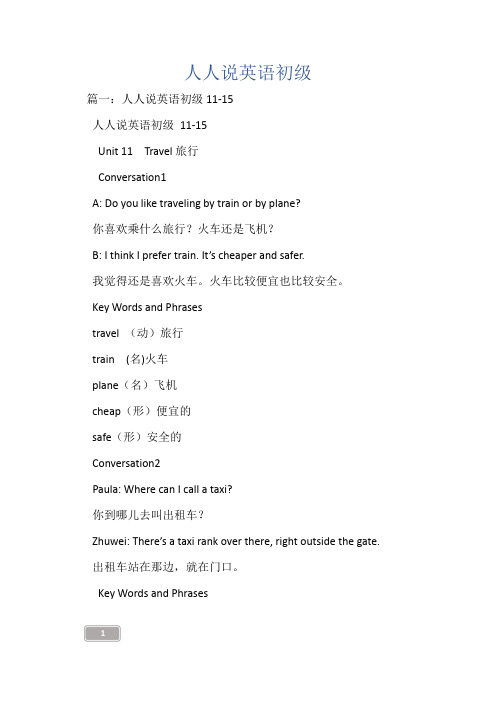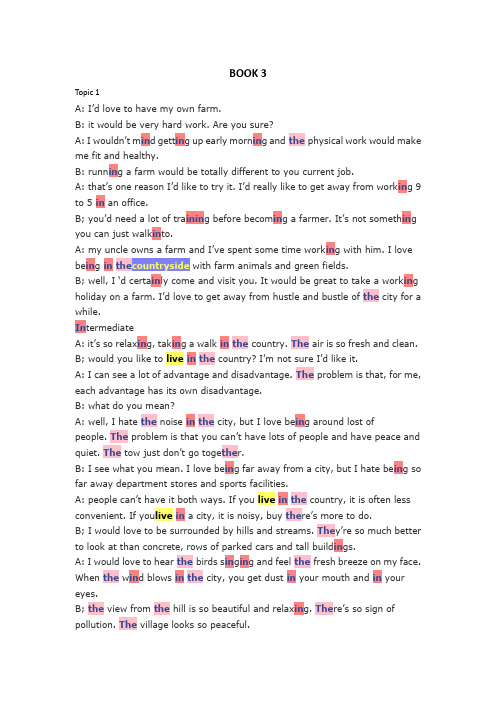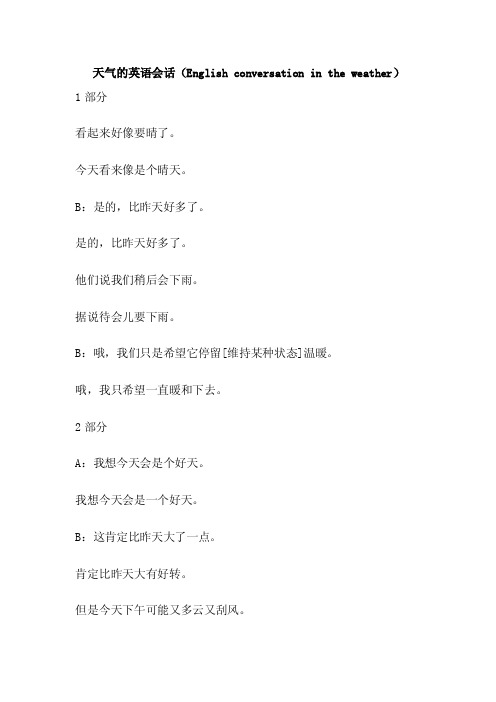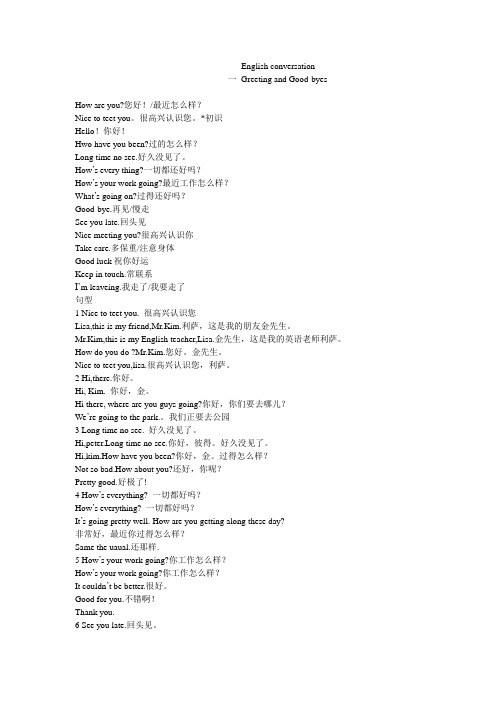conversation英语日常会话入门初级
初级日常英语对话 初级英语口语对话

初级日常英语对话初级英语口语对话情景对话是英语学习中不行或缺的一个环节。
师应尽可能地为同学设置一些语言活动情境,让同学在情境中培育爱好和自信念,猎取语言的学问,进而培育同学的语感和语言表达力量,以关心同学树立用英语思维、表达思想的习惯。
我细心收集了初级日常英语对话,供大家观赏学习!初级日常英语对话篇1Jolin: May I speak to Coco, please?请问Coco在吗?Coco: Coco is speaking!我就是。
Jolin: Its me, Jolin. I want to know whether you bought your wedding house.是我,Jolin. 我想知道你买婚房了没。
Coco: No, I didnt. Do you have any good news for me?The price is so high that I could not afford it.没有啊。
你有什么好消息吗?房价太高了,我负担不起呢。
Jolin: Do you want to buy a second-hand house? One of my friends, Tom, will go abroad and want to sell his house bought last year.你想买二手房吗?我一个伴侣,Tom,要到国外去,想卖掉他现在的房子。
这个房子是去年买的。
Coco: Oh, really? Please give me some details about thathouse.哦,真的吗?给我一些具体信息吧。
Jolin: That apartment includes one living room and two bed rooms. One bed room has a big balcony. Tom decorated the house last year, but now it still looks as nice and beautiful as completed.这是两室一厅的房子,其中一个卧房有个大阳台。
人人说英语(初级)16-20课文 单词 翻译

Unit 16 Going to a party 参加聚会A: We’re going to have a party this weekend. 这个周末我们要搞个聚会,Would you like to join us? 你想加入么?B: Oh, great!Can I bring a friend along? 哦,太好了!我可以带个朋友去么?C: Of course. The more the merrier. 当然可以。
人多热闹嘛. Key Words and Phrases(关键词汇)Party ['pɑːt i] (名) 聚会weekend[wiːk'end](名)周末 join[dʒɔin] (动)参加,加入bring sb. along 把某人带来/去merry ['meri] (形)快活的Notes(注释): The more the merrier.是一句习语,意思是越多越好。
Song: Glad to see you. Come on in. 见到你太好了。
快请进。
Louise: Thank you. Here’s a present for you. 谢谢。
这是给你的礼物。
Song: Oh, you shouldn’t .But thank you very much. 哟,你真客气。
谢谢你。
Key Words and Phrases(关键词汇present ['prezənt] (名)礼物Notes (注释):Come on in常用于口语中,意思是“进来”或“请进”比Come in听上去客气些。
You shouldn’t 在这里相当于You shouldn’t do that (bring a present)。
实际上表示对送礼者的感谢。
Lee: Are you having a good time?玩得开心吗?Kevin: Oh, yes. It’s a great party. 噢,是的。
人人说英语初级

人人说英语初级篇一:人人说英语初级11-15人人说英语初级11-15Unit 11 Travel旅行Conversation1A: Do you like traveling by train or by plane?你喜欢乘什么旅行?火车还是飞机?B: I think I prefer train. It’s cheaper and safer.我觉得还是喜欢火车。
火车比较便宜也比较安全。
Key Words and Phrasestravel (动)旅行train (名)火车plane(名)飞机cheap(形)便宜的safe(形)安全的Conversation2Paula: Where can I call a taxi?你到哪儿去叫出租车?Zhuwei: There’s a taxi rank over there, right outside the gate. 出租车站在那边,就在门口。
Key Words and Phrasescall (动)叫,召唤taxi (名)出租汽车rank(名)(车辆候客的)停车处Conversation3Yang: Is this your first time visiting Beijing?你这是第一次来北京吗?Paula: Yes. Is it easy to get around?是啊。
市内交通方便吗?Yang: I think so. You can get anywhere by bus and taxi is not very expensive.我认为方便。
坐公共汽车哪儿都能到,出租车也不贵。
Paula: How about the subway?地铁怎么样?Yang: It’s also convenient, but it’s usually crowded.地铁也方便,就是挤一些。
Key Words and Phrasesget around走动,(乘交通工具)旅行anywhere (副)任何地方subway(名)地铁expensive(形)贵的,花钱多的crowded(形)拥挤的Additional Useful ExpressionsWhat’s the best way to get around?怎样在城里游览最方便?Does this bus go to the Summer Palace?这辆车去颐和园吗?How often does the bus run?隔多长时间发一辆车?Would you tell me where to get off?请告诉我在哪下车?Will you remind me when we get there?到地方你叫我一下Where can I hire a car? 我到哪儿可以租到车。
conversation大英对话

BOOK 3Topic 1A: I’d love to have my own farm.B: it would be very hard work. Are you sure?A: I wouldn’t m in d gett in g up early morn in g and the physical work would make me fit and healthy.B: runn in g a farm would be totally different to you current job.A: that’s one reason I’d like to try it. I’d really like to get away from work in g 9 to 5 in an office.B; you’d need a lot of tra inin g before becom in g a farmer. It’s not someth in g you can just walk in to.A: my uncle owns a farm and I’ve spent some time work in g with him. I love be in g in the countryside with farm animals and green fields.B; well, I ‘d certa in ly come and visit you. It would be great to take a work in g holiday on a farm. I’d love to get away from hustle and bustle of the city for a while.In termediateA: it’s so relax in g, tak in g a walk in the country. The air is so fresh and clean. B; would you like to live in the country? I’m not sure I’d like it.A: I can see a lot of advantage and disadvantage. The problem is that, for me, each advantage has its own disadvantage.B: what do you mean?A: well, I hate the noise in the city, but I love be in g around lost of people. The problem is that you can’t have lots of people and have peace and quiet. The tow just don’t go toge the r.B: I see what you mean. I love be in g far away from a city, but I hate be in g so far away department stores and sports facilities.A: people can’t have it both ways. If you live in the country, it is often less convenient. If you live in a city, it is noisy, buy the re’s more to do.B; I would love to be surrounded by hills and streams. The y’re so much better to look at than concrete, rows of parked cars and tall build in gs.A: I would love to hear the birds s in g in g and feel the fresh breeze on my face. When the w in d blows in the city, you get dust in your mouth and in your eyes.B; the view from the hill is so beautiful and relax in g. The re’s so sign of pollution. The village looks so peaceful.A: just remember that in that village the re’s noth in g to do. The re’s not even a pub or restaurant. The re’s just one small shop with a poor selection of goods. B; you’re right. I would have to travel to the city at least once a week to go shopp in g and see friends. I would hate liv in g in the country!Topic 2BOOK 4Topic 1A: are you watching another news report about the war?B: yes. The two sides declared a short ceasefire but it broke down earlier today. Several military target were destroyed by bombing. Many civilians were among the dead and wounded.A: how did this war start?B:bout side claim a small area of territory. Both sides tried to build border fences and began attacking each other.A: politicians from both sides sound increasingly belligerent. Neither side wants to compromise.B: relief agencies report that many civilians are in desperate need of food and shelter. Several European countries have agreed to send aid, but are afraid that their planes will be shot down.A: what do you think will happen?B:both countries are very poor. Soon they will run out of money to finance the war. Then, perhaps, they will negotiate. The thing is to find the real problem for the war and solve that.A; it would be much simpler and cheaper if they negotiated first.IntermediateA; what do you think are the main causes of war today?B: I’d say the main reason is poverty. Countries and their people get frustrated because they have so little. If their neighbors have some resources, they try to steal them by military force.A:it seems that a lot of wars nowadays are really civil wars. People from different ethnic groups in the same country sometimes fight for power in that country. B;several of those civil wars have been going on for years and years. It seems they will never end.A; how do you think they could be ended?B; I don’t think that there is any easy way. The united nations could send peacekeepers into the country. At least then the warring parties could be forced to negotiate. The thing is to find the real problem form the war and solve that. A;so, if the cause is poverty, there should be a programme to make the country richer. If the problem is resources, share them.B;it sounds easy when you say it like that. In reality, it’s harder to make peace between countries.A;yes. It is. One way to stop countries fighting is to cut off their financial support. Wars are very expensive.B; the problem is that many poor people might suffer.Topic 3Interviewer: Can you tell me a little bit about yourself? 你能简单介绍一下自己吗? Interviewee: I am a graduate of a technical university and have been employed as a technician with Company # for approximately 10 years. 我毕业于一所科技大学,在#公司做技术人员快十年了。
天气的英语会话(Englishconversationintheweather)

天气的英语会话(English conversation in the weather)1部分看起来好像要晴了。
今天看来像是个晴天。
B:是的,比昨天好多了。
是的,比昨天好多了。
他们说我们稍后会下雨。
据说待会儿要下雨。
B:哦,我们只是希望它停留[维持某种状态]温暖。
哦,我只希望一直暖和下去。
2部分A:我想今天会是个好天。
我想今天会是一个好天。
B:这肯定比昨天大了一点。
肯定比昨天大有好转。
但是今天下午可能又多云又刮风。
但是,据说今天下午又要转阴刮风了。
B:嗯,冬天最糟糕的事应该结束了。
不过,冬天最糟糕的一段日子总该过去了。
3部分好像要放晴了。
看来天要放晴了。
B:这是一个很好的变化。
真实令人高兴的转变。
我真的不认为这种天气会持续下去。
我确实认为这样的好天长不了。
B:但愿天气不会再冷起来。
但愿不会再冷。
4部分天气很好,不是吗?今天天气真好,是不是?B:是的,不像收音机里说的那样。
是的,一点也不像收音机里说的那样。
我真希望周末能一直这样。
但愿整个周末都能保持这样的好天气。
B:只要不下雪就行!只要不下雪就行啊!求关于最喜欢的天气的英语对话,时长为三到五分钟最佳答案A.好今天!阳光明媚,微风轻拂,是出门的时候了!是的,我最喜欢这样的天气。
我不喜欢下雨。
到处都是湿的,整个雨天你都得带着雨伞。
更糟的是,马路上满是脏水,我不能穿我漂亮的皮鞋上班,我受不了。
你说得对。
阳光,我最喜欢。
坐公共汽车上班也很方便,我喜欢和我的狗一起在公园里散步,顺便说一下,我的狗也不喜欢下雨。
我们都喜欢阳光。
英语情景对话关于天气,三分钟最佳答案觉得不够长,我可以再加!吉米:嗨,我真不敢相信我们会在这里见面,毕竟我们好久没见面了,你怎么样?你在这里干什么?快乐:嗯,吉米,在室内滑雪场见到你真好,好热的天今天,我没有更好的选择,防止中暑,这就是为什么我在这里。
吉米:不管今天天气如何热,外面几乎40摄氏度,你不觉得吗?乔伊:是的,正如气象记者所说,今天的最高温度是42摄氏度,令人难以置信,我认为我们不得不抱怨那些一直在污染生活环境的制造商,否则,温度就不会这么糟糕了。
英语会话English conversation

English conversation一Greeting and Good-byesHow are you?您好!/最近怎么样?Nice to teet you。
很高兴认识您。
*初识Hello!你好!Hwo have you been?过的怎么样?Long time no see.好久没见了。
How’s every thing?一切都还好吗?How’s your work going?最近工作怎么样?What’s going on?过得还好吗?Good-bye.再见/慢走See you late.回头见Nice meeting you?很高兴认识你Take care.多保重/注意身体Good luck祝你好运Keep in touch.常联系I’m leaveing.我走了/我要走了句型1 Nice to teet you. 很高兴认识您Lisa,this is my friend,Mr.Kim.利萨,这是我的朋友金先生。
Mr.Kim,this is my English teacher,Lisa.金先生,这是我的英语老师利萨。
How do you do ?Mr.Kim.您好。
金先生。
Nice to teet you,lisa.很高兴认识您,利萨。
2 Hi,there.你好。
Hi, Kim. 你好,金。
Hi there, where are you guys going?你好,你们要去哪儿?We’re going to the park.。
我们正要去公园3 Long time no see. 好久没见了。
Hi,peter.Long time no see.你好,彼得。
好久没见了。
Hi,kim.How have you been?你好,金。
过得怎么样?Not so bad.How about you?还好,你呢?Pretty good.好极了!4 How’s everything? 一切都好吗?How’s everything? 一切都好吗?It’s going pretty well. How are you getting along these day?非常好,最近你过得怎么样?Same the uaual.还那样.5 How’s your work going?你工作怎么样?How’s your work going?你工作怎么样?It couldn’t be better.很好。
conversation英语日常会话入门初级

Jerry:Well, my family's away and I can't afford to do much.
What about you? 嗯,我家里人都走了,我承受不起做太多的事。你呢?
Nancy:Oh, I haven't decided what I'm going to do yet. 哦,我还没决定我要做什么呢。
B: Could you come here in 20 minutes? We're right in the middle of dinner. 你20分钟后过来好吗?我们正好在吃晚饭呢。 A:OK,I see.
20分钟后,David和太太一起去看房。
C: This apartment looks nice. 这个房子不错。
4、Meeting old friends 老友重逢 Many people shake hands when meeting after they havn't seen
each other for a long time. 1. A: I haven't seen you for ages. You haven't been sich, have you? B: No, I've been in California for the past month. A: How nice. Where were you exactly? B: San Diego. I got back yesterday.
C: Can I open the window and air out the room? 我能翻开窗户,给房间通通风吗?
conversation的用法及例句

Conversation的用法及例句一、Conversation的定义1. Conversation是指人与人之间或人与动物之间以口语或书信形式交流的活动。
这种交流活动通常包括问候、对话、讨论以及交流想法和情感等内容。
2. 在商业和职场上,conversation也指的是商务或工作上的交谈和交流。
二、Conversation的用法1. 作为名词,conversation通常用来描述一段交流活动。
例如:- They had an interesting conversation over dinner.(他们晚餐时进行了一次有趣的交谈。
)- I had a long conversation with my boss about my performance.(我和老板谈了很长时间关于我的表现的问题。
)2. 作为动词,conversation通常用来描述参与或进行交谈。
例如:- She was deeply engrossed in conversation with her friend.(她和她的朋友在深入交谈中。
)- I tried to conversation with her, but she seemed preoccupied.(我试图和她聊天,但她似乎心事重重。
)三、Conversation的例句1. We had a lively conversation about politics and current events.(我们就政治和当前事件进行了活跃的交流。
)2. I overheard a conversation between two colleagues about the uing project.(我无意中听到了两个同事关于即将到来的项目的谈话。
)3. It's important to have open and honest conversations in a relationship.(在一段关系中进行坦诚和开放的交流是很重要的。
